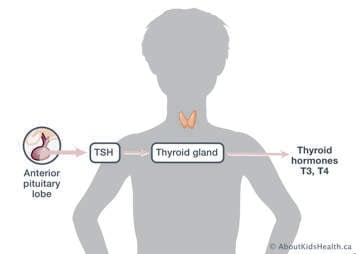What is hypopituitarism?

Hormones are chemicals produced in the body. They act as messengers that travel to other parts of the body where they affect how organs work. Hypopituitarism is a condition where the pituitary gland does not produce one or more pituitary hormones, or it does not produce enough hormones. "Hypo" means less than usual. The term "panhypopituitarism" means many or all of these hormones are deficient ("pan" means all).
The pituitary is a pea-sized gland located in the middle of the skull. It is part of the body’s endocrine system, which includes all of the glands that produce and regulate hormones. The pituitary gland acts as the control centre for other glands. Hormones produced in the pituitary gland impact many other parts of the body. The pituitary releases various hormones in response to chemical messages it receives from the part of the brain called the hypothalamus. One of the hormones released is called thyroid stimulating hormone (TSH).
What is thyroid stimulating hormone deficiency?
The pituitary gland releases TSH which signals to the thyroid gland to release thyroid hormones (T3 and T4). The thyroid is a small gland located in the neck, in front of the trachea (windpipe).

Thyroid hormones are important for growth, physical development, brain development, and for normal metabolism of the body. All cells of the body require adequate levels of thyroid hormone in order to work properly. A deficiency of TSH results in a lack of thyroid hormone being produced and released from the thyroid gland.
How is TSH deficiency diagnosed?
Several ways your child’s doctor determines that your child is lacking thyroid hormones are:
- evaluating symptoms
- physical examination
- review growth rate during childhood and adolescence
- blood tests that measure TSH, free T4 and T3 levels
How is TSH deficiency treated?
If your child’s thyroid hormone level (T4) is too low, a daily pill(s) is prescribed to replace the hormone. The pill often prescribed is called levothyroxine sodium (Synthroid, Eltroxin). This medication will be taken daily and will be continued throughout your child’s life. There are many different doses of thyroid medication.
Store the pills at room temperature and protect them from light and moisture. It is better to take levothyroxine sodium in the morning, 30 to 60 minutes before a meal, as absorption is increased on an empty stomach. If this is impossible, it is important to be consistent about the timing of taking the medication, so choose a time of day that works best into the family routine and have your child take it at that time each day. If your child forgets to take the thyroid medication, they should take it as soon as they remember or wait until the next day when the next dose is due.
For infants who are unable to swallow whole pills, you can crush the tablet and give the medication on the tip of a moist finger placed inside the infant’s mouth. Taking the medication with soy-based or iron-rich infant formulas may decrease the absorption in the body, however, thyroid tests will be checked frequently and adjustment to doses made as needed.
If your child is taking iron supplements or antacids while taking levothyroxine, the thyroid medication should be taken at least 4 hours apart from those medications. Your health-care team can help you plan this into your daily routine.
Between clinic visits, it is important to know what signs and symptoms may occur if too little or too much thyroid hormone medication is being taken. If your child experiences any of the following symptoms, talk to your health-care provider. They may need to adjust your child’s medication dosage.
| Too little thyroid hormone (not enough thyroid medication) | Too much thyroid hormone (too much thyroid medication) |
|---|---|
|
|